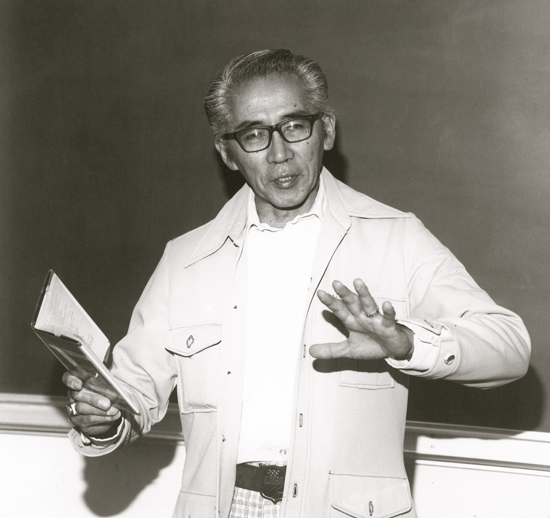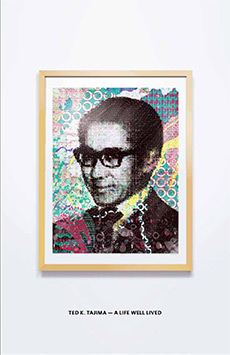Ted Tajima Dies at 88; High School Journalism Teacher Inspired Many
===
By J.K. Yamamoto
RAFU STAFF WRITER
===
Ted Tajima, a noted journalism instructor who was a mentor to many professional journalists, passed away on Feb. 20. He was 88.
Tajima, Alhambra High School’s journalism advisor for 35 years until his retirement in 1983, was a founder and president of the Southern California Journalism Education Association, which named a scholarship after him, and a national vice president of the Journalism Education Association.
The California Newspaper Publishers Association gave him an award for outstanding teaching in 1967, and the JEA presented him with the Medal of Merit in 1970. He was also a recipient of the Asian American Journalists Association’s Lifetime Achievement Award.
During his tenure, Alhambra High’s newspaper, The Moor, was a perennial NSPA (National Scholastic Press Association) All-American, winning that distinction 26 consecutive times, starting in 1957. It also received two NSPA Pacemaker awards for innovation and overall excellence.
One of his protégés is Los Angeles Times staff writer Elaine Woo. “He was the kind of teacher you never forget, compassionate but strict, particularly about adhering to the facts, writing without affectation, and learning all aspects of newspaper production, including selling ads,†she recalled. “Many of his lessons have remained with me …
“It’s sad that he could not become a reporter or editor for a mainstream newspaper. He finished college right after World War II and anti-Japanese sentiment was a huge barrier. I never heard him express bitterness about this, although I’m sure he felt it.
“At the same time, I’m grateful he became a teacher because without his encouragement, I would not have gone into journalism, a very non-traditional field for Asian Americans in the 1970s when I was his student.â€
Woo, who worked for the Herald-Examiner before joining the Times, has said that Tajima had the same impact on her that the late Jaime Escalante, the Garfield High School math teacher who was the subject of the movie “Stand and Deliver,†had on his students.
Joe Saltzman, a journalism professor at USC and former CBS producer, was Tajima’s student in the 1950s. He remembered being devastated when the high school counselor told him he wasn’t college material and should go into his father’s profession, washing windows. He told his English and journalism teacher, whom everyone called “T.â€
“In all the years I’ve known Ted, I’ve never seen him that angry,†Saltzman said. “He told me to wait there for him, and then went to see that high school counselor. He came back and told me that together, we would work to get me into the best school of journalism on the West Coast – the University of Southern California – and with a scholarship as well. And he made it happen.â€
Having taught for 44 years at USC, where he directs the “Image of the Journalist in Popular Culture†project, Saltzman added, “I know I became a teacher because of his influence on me. I wanted to do for future journalists what he had done for me … My story is not a unique one. Hundreds of Ted’s former students would tell you much the same thing. He changed their lives as he did mine. And he did it with humor, with patience, with grace, with intelligence, with compassion.â€
Others who benefited from Tajima’s guidance include Arnold Shapiro, a Emmy winner for the documentary “Scared Straightâ€, and Steve Padilla, an editor at the Los Angeles Times.
On the occasion of his retirement, Tajima’s former students raised money to send him and his wife on a trip to Japan.
Experiencing Prejudice
Born in Salt Lake City to Issei parents on Aug. 6, 1922, Tajima moved to California with his family at the age of 6. He had three brothers and a sister. Another sister had died as an infant in Japan. His father, Kengo, was the pastor of Japanese Union Church of Pasadena, now known as First Presbyterian Church of Altadena.
In an interview he did for “Face to Face,†an educational project comparing the experiences of Japanese Americans after Pearl Harbor and Arab Americans after 9/11, Tajima described what it was like to experience prejudice: “Well, the public pool in Pasadena down at Brookside Park was closed to ethnic minorities six days of the week and open only one day of the week. It was called, euphemistically, ‘International Day,’ and it was the day that the blacks and the Latinos and the Asians could swim. We didn’t say, ‘Gosh, this is terrible, this is racial discrimination of the worst kind!’ We just lived with it … because we kind of grew up with it, you know.â€
Tajima graduated from Pasadena High School in 1940 and majored in English at Occidental College, but his education was interrupted by World War II. He recalled the day his family’s life changed: “On a Sunday, we were going home from church, and there’s just a bunch of young people in the car. We stopped at Curry’s Ice Cream Store to indulge. And someone came in saying that Pearl Harbor was bombed … We thought that was kind of a stupid thing the Japanese were doing, but it didn’t occur to us right away that this meant war.â€
At the urging of his father, he relocated to Salt Lake City before the West Coast internment orders were issued. As “voluntary†evacuees, neither he nor his brothers were interned, but his parents remained behind and were sent to the Gila River camp in Arizona while his sister Sophie and her husband, Rev. Donald Toriumi, were sent to Heart Mountain in Wyoming. He later moved to Ohio, where he was reunited with his parents and married Setsuko Itow, whom he had met in high school.
Tajima said of the internment, “Too many lives were affected. Too much property was lost. It was not good in any respect that way. Education for example — many people, their education was cut off. Kids in high school … went to camps and there was almost a jerry-built high school there. They used people who were in college, they used whoever they could recruit to come and teach in a God-forsaken place.â€
After the war, Tajima returned to Occidental and graduated in 1946. He was drafted into the Army and spent one year with a counter-intelligence unit in Maryland, teaching Japanese to agents who would be serving in occupied Japan. He found deficiencies with their writing in English and taught them how to improve their English as well. He later earned a master’s degree in English from USC.
Although he wrote for the campus newspapers at Occidental and USC, a job at a mainstream paper wasn’t in the cards. “When I came out of the Army, I hoped to do some newspaper work, but the only newspapers that were hiring ethnic minorities were ethnic minority papers,†Tajima said in a recent interview. “My wife said, ‘Why don’t you teach?’ Best thing she ever said to me.â€
In 1948, Tajima became the first Asian American teacher at Alhambra High School. At the time, he said, there were “three Asians on campus … two students and me. But when I left, many more.â€
While teaching, he contributed articles to the Rafu Shimpo on a freelance basis.
For over 60 years, Tajima contributed his skills to The Clarion, the newsletter of First Presbyterian Church of Altadena. “That was his baby,†said his brother Calvin. “Rain or shine, he would get it out.†Tajima was also a church elder who served on many presbytery, synod, and general assembly committees. His daughter Wendy, a minister, temporarily took over editing duties in December.
“A lengthy relationship between us has come to an end,†Tajima wrote last month. “First and foremost, I have considered my work on The Clarion as a ministry which all of us share, and I trust that it will continue as such in new hands. It has been a long journey, but one that we find gratifying as we work for the family of God.â€
In thanking Tajima for his decades of service, the church said in a statement, “Ted is an icon among us of faithful service and Christian devotion. We continue to be grateful for his steady and positive presence in our community.â€
He was preceded in death by his wife, Setsuko; brothers Tsuneo and Yuji; sister Sophie; and granddaughter Tara Kimberly Sims. Survivors include daughters Pamela Tajima Praeger, Elaine Tajima Johnston, Linda Tajima and Wendy Tajima; son-in-law Stanley Tajima Johnston; grandchildren David Yenoki, Aimee Epstein and Moira Johnston; and brother Calvin.
Services will be held on Saturday, March 12, at 10 a.m. at First Presbyterian Church, 2775 Lincoln Ave. in Altadena. Messages of condolence are being posted on the “Ted Tajima Fan Club†page on Facebook.


